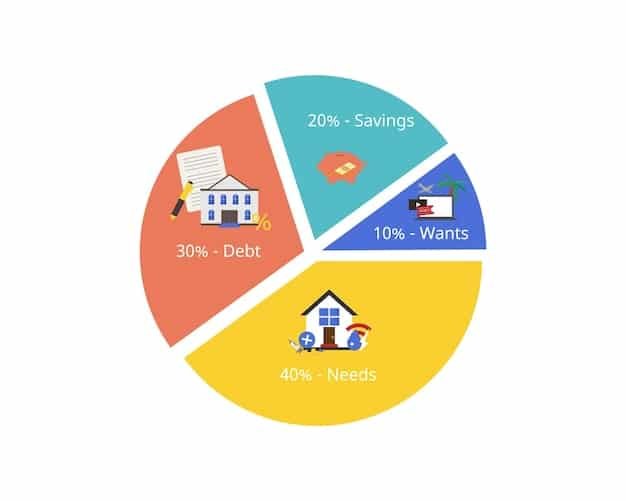Universal Basic Income: State Initiatives & Financial Planning in the US

State-level initiatives for universal basic income (UBI) are gaining traction across the U.S., prompting significant financial planning considerations for residents as they navigate potential supplemental income and its impact on their financial well-being.
The concept of state-level initiatives for universal basic income (UBI) and financial planning implications is rapidly evolving in the United States, potentially reshaping how individuals manage their finances and plan for the future. Exploring these initiatives offers valuable insights for anyone seeking to understand the changing landscape of personal finance.
Understanding Universal Basic Income (UBI) Initiatives at the State Level
Universal Basic Income (UBI) is a concept that’s been debated for decades, and now it’s starting to take shape in various states across the U.S. These state-level initiatives for universal basic income (UBI) aim to provide a guaranteed minimum income to residents, regardless of their employment status.
Understanding the nuances of UBI programs at the state level is crucial for residents and financial planners alike. The specifics can vary significantly from one state to another, affecting eligibility, payment amounts, and overall program goals.
Key Features of State-Level UBI Programs
State-level UBI programs often incorporate unique design elements tailored to address specific local needs and economic conditions. Here are some of the key features:
- Eligibility Criteria: Some programs target specific demographics, such as low-income families or individuals facing job displacement due to automation.
- Funding Mechanisms: States explore various funding sources, including state taxes, philanthropic contributions, and partnerships with private organizations.
- Pilot Programs: Many initiatives begin as pilot programs to assess the feasibility and impact of UBI before broader implementation.

Examples of State UBI Initiatives
Several states have already launched or are considering UBI programs, each with its own unique approach:
- California: Some cities in California, like Stockton, have experimented with basic income programs, offering monthly payments to select residents. A statewide initiative has been considered, but faces funding challenges.
- Alaska: While not strictly UBI, Alaska’s Permanent Fund distributes annual dividends to residents from oil revenues, serving as a form of basic income.
- New York: There have been discussions and pilot programs exploring the feasibility of UBI, particularly in addressing poverty and income inequality in urban areas.
In summary, as state-level initiatives for universal basic income (UBI) gain traction, residents need to understand how these programs operate and how they might affect their financial circumstances.
How UBI Impacts Individual Financial Planning
The introduction of a universal basic income can significantly alter an individual’s financial landscape. Understanding these impacts is essential for effective financial planning, as UBI can affect savings, investment strategies, and overall financial security.
With UBI potentially supplementing income, individuals need to assess how this guaranteed income stream can change their financial priorities. From adjusting investment goals to reevaluating debt management strategies, UBI brings new considerations to the forefront.
Adjusting Savings and Investment Strategies
A guaranteed income floor can allow individuals to take more risks with investments or save for longer-term goals. Depending on the amount received, the following adjustments might be considered:
- Increased Investment Risk: With a safety net in place, individuals may feel more comfortable investing in higher-risk, higher-reward assets.
- Long-Term Savings: UBI can make it easier to save for retirement, education, or other long-term goals without the immediate pressure of covering basic needs.
- Emergency Funds: The need for a large emergency fund might decrease, as UBI provides a cushion during unexpected financial hardships.
Re-evaluating Debt Management
UBI can provide individuals with the means to address existing debts more effectively, offering opportunities to restructure or pay down high-interest loans:
- Debt Consolidation: UBI could facilitate debt consolidation strategies, allowing individuals to combine multiple debts into a single, lower-interest loan.
- Accelerated Debt Repayment: The additional income can be used to make extra payments on mortgages, credit cards, or student loans, reducing the total interest paid over time.
- Avoiding New Debt: UBI can help prevent the accumulation of new debt by providing a financial cushion during emergencies or periods of unemployment.

Impact on Tax Planning
The tax implications of UBI are an important aspect of financial planning. Here’s how UBI might affect your tax situation:
- Taxable Income: Depending on the program design, UBI may be considered taxable income, requiring individuals to adjust their tax withholdings or estimated tax payments.
- Tax Credits and Deductions: Receiving UBI could affect eligibility for certain tax credits and deductions, such as the Earned Income Tax Credit or child tax credits.
- Overall Tax Liability: Understanding how UBI interacts with existing tax laws is essential for accurately estimating your overall tax liability and avoiding surprises at tax time.
In conclusion, the financial planning implications of UBI are diverse and require careful consideration. Adapting your strategies to account for this guaranteed income can lead to greater financial stability and long-term security.
Legal and Regulatory Considerations for UBI Recipients
As state-level initiatives for universal basic income (UBI) gain traction, it’s crucial for recipients to understand the legal and regulatory environment surrounding these programs. Understanding these factors can help you make informed decisions about your finances and how UBI interacts with other government benefits.
Different states have different rules and regulations governing UBI programs, so it’s important to stay informed about the specific requirements in your state. This includes understanding eligibility criteria, reporting requirements, and potential impacts on other benefits.
Impact on Eligibility for Other Government Benefits
One of the key considerations for UBI recipients is how this income might affect their eligibility for other government assistance programs. This can include programs such as:
- Supplemental Nutrition Assistance Program (SNAP): Receiving UBI could potentially reduce or eliminate SNAP benefits, depending on the income thresholds set by the program.
- Medicaid: UBI income might affect eligibility for Medicaid, as it is often tied to income levels.
- Supplemental Security Income (SSI): Individuals receiving SSI may see a reduction in their benefits if they also receive UBI.
Reporting Requirements and Compliance
UBI recipients are typically required to report their income to the relevant government agencies to ensure compliance with program rules. This may involve:
- Regular Income Verification: States may require periodic verification of income to ensure continued eligibility for UBI.
- Reporting Changes in Circumstances: UBI recipients may need to report changes in employment status, household composition, or other factors that could affect their eligibility.
- Accurate Record-Keeping: Maintaining accurate records of UBI payments and other income sources is essential for compliance and tax purposes.
Navigating Legal Challenges
The legal landscape surrounding UBI is still evolving, and there may be challenges related to the implementation and administration of these programs. Issues that may arise include:
- Constitutional Issues: Some legal scholars have raised questions about the constitutionality of certain UBI programs, particularly regarding equal protection and due process.
- Funding Disputes: Legal challenges may arise over the allocation of funds for UBI programs, particularly if they compete with other government priorities.
- Administrative Disputes: Disputes may occur between UBI recipients and program administrators over eligibility, payment amounts, or other issues.
In conclusion, being aware of the legal and regulatory considerations surrounding UBI is essential for navigating your financial situation effectively. Stay informed about the specific rules in your state and seek professional advice if needed.
Strategies for Maximizing the Benefits of UBI
Receiving UBI presents a unique opportunity to enhance your financial stability and achieve your long-term goals. By implementing effective strategies, you can maximize the benefits of this guaranteed income and improve your overall financial well-being.
One of the keys to maximizing UBI is developing a clear financial plan and setting specific goals. This will help you prioritize your spending, savings, and investments, ensuring you make the most of the additional income.
Budgeting and Expense Management
Creating a budget is essential for tracking your income and expenses and identifying areas where you can save more. Some tips for effective budgeting include:
- Tracking Your Spending: Use budgeting apps, spreadsheets, or traditional methods to monitor where your money is going each month.
- Identifying Needs vs. Wants: Distinguish between essential expenses and discretionary spending to identify potential areas for cutbacks.
- Setting Financial Goals: Define specific, measurable, achievable, relevant, and time-bound (SMART) goals to guide your budgeting efforts.
Investing for the Future
Investing is a powerful tool for growing your wealth over time. With UBI providing a safety net, you may be able to take more risks or invest in longer-term assets. Investment options might include:
- Stocks: Consider investing in individual stocks or stock mutual funds for potential long-term growth.
- Bonds: Bonds can provide a more stable income stream and reduce overall portfolio risk.
- Real Estate: Investing in real estate can provide both income and appreciation potential.
Building an Emergency Fund
Having an emergency fund is crucial for covering unexpected expenses without derailing your financial plan. While UBI can provide a cushion, it’s still important to have savings set aside for emergencies. Consider these points when building your emergency fund:
- Set a Target Amount: Aim to save at least three to six months’ worth of essential living expenses in your emergency fund.
- Keep It Accessible: Store your emergency fund in a liquid account, such as a savings account or money market account.
- Replenish After Use: If you need to dip into your emergency fund, make it a priority to replenish it as soon as possible.
In short, by developing a solid financial plan, effectively managing your budget, investing wisely, and building an emergency fund, you can leverage UBI to achieve your financial goals and create a more secure future.
The Role of Financial Advisors in UBI Planning
Navigating the complexities of UBI and its impact on financial planning can be challenging. Financial advisors play a crucial role in helping individuals understand these implications and develop strategies to maximize the benefits of UBI.
Financial advisors can provide personalized guidance tailored to your specific financial situation and goals. Their expertise can help you make informed decisions about saving, investing, debt management, and tax planning in the context of UBI.
Assessing the Impact of UBI on Your Financial Situation
Financial advisors can help you assess how UBI might affect your income, expenses, and eligibility for other government benefits. They can provide insights into:
- Income Projections: Advisors can create detailed income projections that incorporate UBI payments and other sources of income.
- Expense Analysis: They can help you analyze your spending patterns and identify areas where you can save money or reallocate resources.
- Benefits Eligibility: Advisors can assess how UBI might impact your eligibility for programs like SNAP, Medicaid, and SSI.
Developing a Personalized Financial Plan
Based on your financial situation and goals, financial advisors can develop a personalized plan that incorporates UBI into your overall strategy. This might include:
- Savings and Investment Strategies: Advisors can help you develop strategies for saving and investing your UBI income to achieve your long-term goals.
- Debt Management Plans: They can help you create a plan for paying down debt, consolidating loans, or avoiding new debt.
- Tax Planning: Advisors can provide guidance on how UBI might affect your tax liability and help you optimize your tax strategy.
Staying Informed About Changes in UBI Programs
UBI programs are constantly evolving, with changes in eligibility criteria, payment amounts, and other program rules. Financial advisors can help you stay informed about these changes and adjust your financial plan accordingly.
- Monitoring Program Updates: Advisors can track updates from government agencies and other sources to stay informed about UBI program changes.
- Adjusting Financial Plans: They can help you adjust your financial plan in response to changes in UBI programs, ensuring you continue to maximize the benefits.
- Providing Ongoing Guidance: Advisors can provide ongoing guidance and support to help you navigate the complexities of UBI and achieve your financial goals.
In conclusion, a financial advisor can provide valuable assistance in understanding the financial planning implications of UBI and developing strategies to maximize its benefits. Their expertise can help you achieve your financial goals and create a more secure future.
Future Trends in State-Level UBI and Financial Planning
The landscape of state-level initiatives for universal basic income (UBI) is continually evolving, with new developments and trends shaping the future of these programs. Staying informed about these trends is crucial for anticipating the impact of UBI on financial planning.
As technology advances and economic conditions change, UBI programs are likely to adapt and evolve. Understanding these potential changes can help you prepare for the future and make informed financial decisions.
Expansion of UBI Programs
One of the key trends to watch is the potential expansion of UBI programs to more states and localities. Factors driving this trend include:
- Growing Awareness of Income Inequality: Increasing awareness of income inequality and its social and economic consequences is fueling support for UBI.
- Technological Advancements: Automation and artificial intelligence are displacing workers in many industries, leading to concerns about job security and the need for alternative income sources.
- Policy Innovations: States and cities are experimenting with different UBI models, paving the way for broader implementation.
Integration of UBI with Other Social Programs
Another trend is the integration of UBI with other social welfare programs, such as SNAP, Medicaid, and housing assistance. This could lead to more streamlined and efficient delivery of benefits to those in need.
- Coordination of Benefits: States may seek to coordinate UBI payments with other benefits to ensure that individuals receive a comprehensive package of support.
- Simplification of Eligibility Requirements: Integrating UBI with other programs could lead to simplification of eligibility requirements and reduced administrative costs.
- Improved Targeting of Support: By combining UBI with targeted programs, states can better address the specific needs of different populations.
Technological Innovations in UBI Delivery
Technology is playing an increasingly important role in the delivery of UBI, with innovations such as:
- Digital Wallets: UBI payments may be distributed through digital wallets, allowing recipients to access funds quickly and easily.
- Blockchain Technology: Blockchain could be used to track UBI payments and ensure transparency and accountability.
- Artificial Intelligence: AI could be used to personalize UBI programs and target support to those who need it most.
In essence, the future of state-level initiatives for universal basic income (UBI) is likely to be characterized by expansion, integration with other social programs, and technological innovation. Staying informed about these trends is essential for navigating the changing landscape of financial planning and maximizing the benefits of UBI.
| Key Point | Brief Description |
|---|---|
| 💡 State UBI Initiatives | Various states are experimenting with UBI to address income inequality. |
| 💰 Financial Planning | UBI affects savings, investments, and debt management strategies. |
| ⚖️ Legal Aspects | UBI impacts eligibility for other government benefits and requires compliance. |
| 📈 Future Trends | Expect expansion, integration with social programs, and technological innovations. |
Frequently Asked Questions (FAQs)
▼
▼
▼
▼
▼
Conclusion
State-level UBI initiatives mark a significant shift in how we approach financial security. By understanding their implications and seeking expert financial advice, individuals can navigate these changes successfully and build a more stable financial future.





